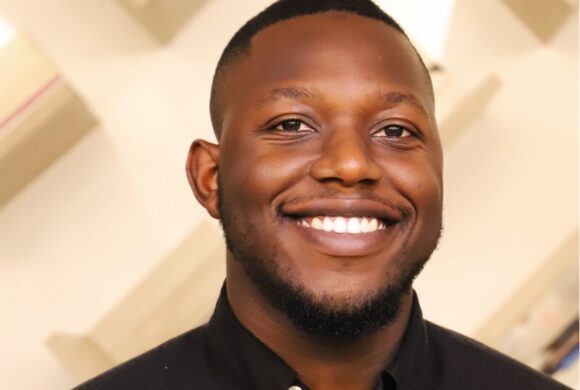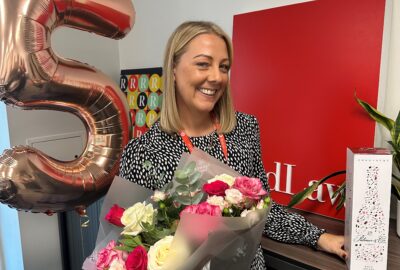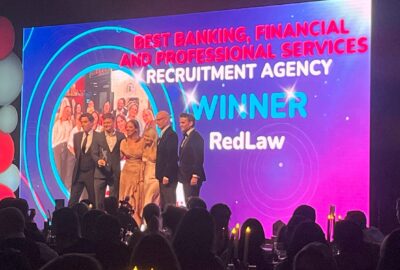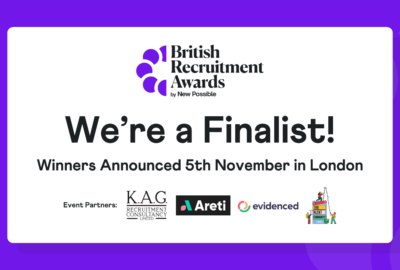
In honour of Black History Month, we have the privilege of chatting with Isaac Peters, a valued member of our team, to discuss his experiences, perspectives, and reflections on his personal and professional life and what Black History Month means to him.
This is not only a time to reflect on the historical achievements and contributions of the Black community but also an opportunity to engage in meaningful conversations with our colleagues. By sharing personal stories, we aim to foster understanding, empathy, and unity within our workplace.
Isaac, Can you share a little about your background and journey that led you to your current role?
Gladly, I studied History, International Relations, and Diplomacy at university back in Nigeria and came straight back to the UK to run my parents’ business. After this I got a job in the contact centre at a bank. From the contact centre I was promoted into recruitment as a customer facing recruiter which I thoroughly enjoyed. I then took an opportunity to get into consulting at a large private management firm. This was the most inclusive environment I’ve ever had the pleasure of working at. Eventually, I left to work for a much larger organisation as a Solutions Consultant before returning to my first love, recruitment, at RedLaw.
In your professional journey, have you encountered any specific challenges related to your ethnicity, and how did you overcome them?
I most definitely have and unfortunately there are a few encounters I can list to you, but for the purpose of conciseness I’ll mention the earliest one I can recall. Whilst working at a previous employer, I was speaking to a colleague and despite being in the centre of the packed office floor and being an arm’s length from them they would flinch whenever I moved my arms as though I were going to attack them. Initially, I presumed they were just a little more cautious than the average person, but I noticed this only occurred with me (being the only person of colour on my team).
Can you share a moment of triumph or achievement in your career that you're particularly proud of?
Of course, in my first stint as a recruiter, I had proven myself a lot more capable than someone that had no previous experience in recruitment. As such, I was afforded a lot more responsibility and was instructed to recruit the entirety of the customer facing staff for two stores in Wales, where the company had no presence whatsoever. It was an extremely big challenge and there were time constraints but ultimately, I was able to deliver with the assistance of an excellent team.
From your perspective, how important is diversity and inclusion in the workplace, and what role do you think it plays in fostering a positive work environment?
I believe diversity and inclusion are essential to fostering a thriving workplace. It is only when a person feels as though they can bring their entire selves to work that their true value can be felt as opposed to the diluted versions we tend to see in organisations.
Are there specific initiatives or practices you believe organisations should adopt to promote diversity and inclusivity?
I think retreats where they enter other communities/ schools/ seminars or webinars that expose their workforce to the lived experiences and cultures of others would go a long way to fostering inclusivity.
How do you celebrate Black History Month personally, and what significance does it hold for you?
Personally, every month is Black History Month; I’m a walking embodiment of everything my people have been through and an actualisation of their wildest dreams. I feel I take the opportunity to go out of my way to have more conversations with people from other backgrounds, to share my experience with them in an open and honest discourse. I also attend events to further entrench my knowledge of self and other people’s experiences.
Are there any historical figures or events in Black history that have particularly inspired you?
There are honestly several. The typical ones; Martin Luther King, Fred Hampton, Nelson Mandela, Muhammad Ali, Maya Angelou and others like George The Poet, Trevor Noah, Jackie Robinson, Kendrick Lamar and Denzel Washington.
Who has been the most influential person in your life and what impact have they had?
I would have to say Jesus Christ. He’s taught me how to be vulnerable, have authentic relationships and treat others as I want to be treated; “Do unto others as you would have them do unto you,” Luke 6:31. It’s shaped my perspective and is a guiding principle I take into all my interactions with people in my day-to-day life.
What’s the best piece of advice you’ve ever been given and who gave this to you?
I can’t remember exactly who said this, it might have been Dale Carnegie in his book; “How To Win Friends and Influence People”. He said, “You are not the first person to go through what you’re going through, and you will not be the last. Someone succeeded despite this, and others failed because of this. Who will you be?” It’s a challenge more than anything, but it helps me to see the positive in every situation no matter how difficult/painful it is.
How can co-workers and colleagues be supportive allies in promoting a more inclusive workplace?
I think co-workers and colleagues can be supportive by being informed, or by being open to learning and empathising with the perspectives and experiences of others. Though they may never fully understand, it still goes a long way to feel like you’re being heard.
In your opinion, what steps can organisations take to ensure that diversity and inclusion efforts are sustained beyond special events or months, creating a consistently inclusive environment?
Creating a consistently inclusive environment requires ongoing commitment and effort from organisations. There are several steps they can take to ensure that diversity and inclusion efforts are sustained beyond special events or months, but I think the one that is most important in my mind is to foster inclusive communication. Organisations need to encourage open discussions about diversity and inclusion, allowing employees to voice concerns and share their experiences. Moreover, organisations need to ensure diverse representation in company materials, both internally and externally. People of diverse backgrounds should be able to tell immediately that they themselves and people that look like them would be welcome as their complete selves at your organisation.
I believe that by taking these proactive and continuous steps, organizations can create a consistently inclusive environment where employees from diverse backgrounds feel valued, respected, and empowered to contribute their best work.
Subscribe for more insights
Lorem ipsum dolor sit amet consectetur adipisicing elit. Quia at sint modi doloremque.


